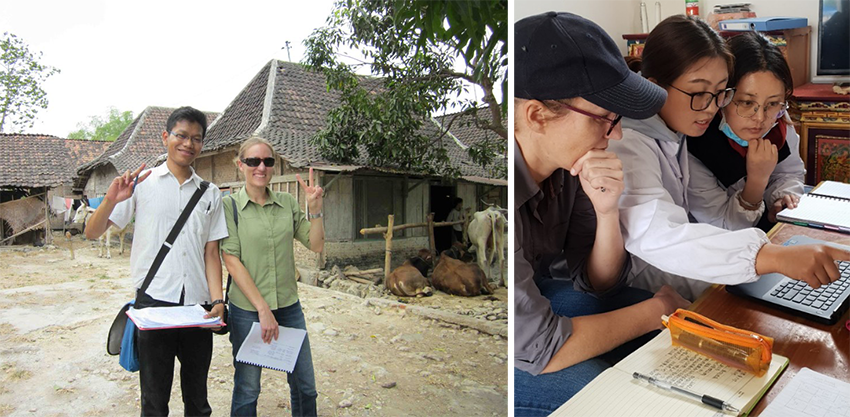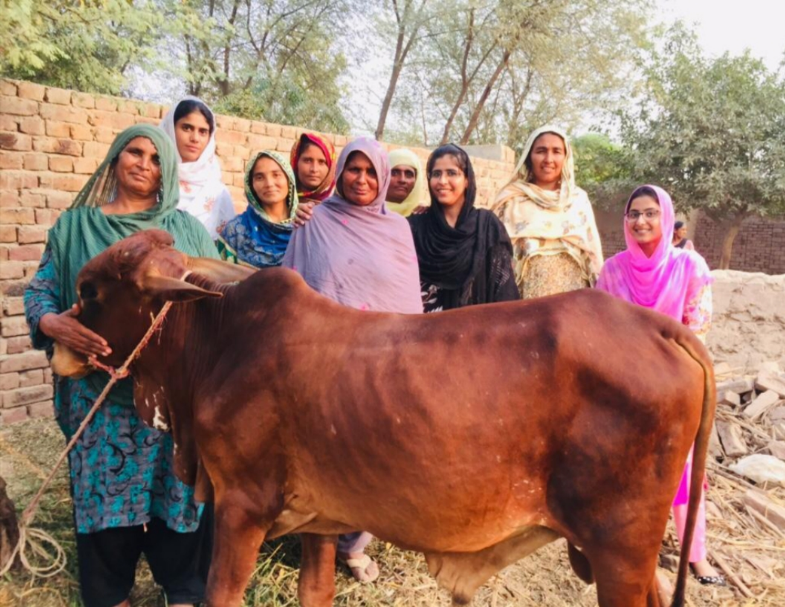Doing international ag research in lockdown
COVID-19 has created personal and professional challenges for all of us. As agricultural scientists, we face similar challenges to many other researchers and industry professionals – experiments are postponed, we write papers from the kitchen table, and almost every interaction with colleagues now happens virtually. But the fact that many of our colleagues and research are based overseas adds another layer of complexity.
At the invitation of RAID and the QAAFI student association, we gathered (online of course!) to discuss some of the specific challenges of doing international ag research in lockdown.

So why do we usually travel?
Our projects are overseas!
Travelling internationally for work is a privilege, but it’s an important part of what we do. Creating impact in another country requires that our research is locally relevant. While some activities requiring specialist equipment or facilities can be conducted back in Australia, most research needs to be based in-country, developed under local conditions and tested by local stakeholders. This is also the best way to build capacity in our partner organisations and research teams.
Nothing beats seeing a farming system firsthand and listening to farmers to help you understand how things work and where the opportunities are. Visiting villages, research stations and lab facilities helps gauge the specific challenges facing in-country researchers – the level of infrastructure available, accessibility of field sites, and capabilities of the local team.
Spending time in-country is also essential for building relationships, which are the backbone of any successful project and may lead to future collaborations. Communication is often easier in person, especially where there are language and technology barriers, and much of our capacity building activities are based on doing, and learning, together.
Importantly, it’s not just the Australian scientists who do the travelling. Where possible we facilitate opportunities for our in-country teams to travel regionally and internationally for training and development purposes.

How have Ag R4D projects been impacted by COVID?
COVID has impacted international agricultural research in many ways. Our project countries have been affected to different degrees, some severely. For our collaborators, COVID has brought personal and professional stress. Local travel restrictions, workplace closures and institutional focus on the direct COVID response limit the time available for research. For the Australian teams, the most obvious consequence is that we can’t travel to our project sites and there’s no timeline for when international travel will be back on the agenda. Some international funding bodies have ceased administrative operations for the immediate future, limiting project income.
These issues affect delivery of project milestones and opportunities for capacity building. Some activities can be delayed, some will take longer to do, and others will have to be replanned completely. We worry about time-critical research, rapidly approaching deadlines, and the potential for future funding.
What are we doing at the moment?
Like many of you, our days seem to be consumed by online meetings rather than doing science. We’re doing a lot of planning, and replanning, for what we’ll do when restrictions ease. We’re also working through project variations with research funders – luckily most have been very flexible.
Where internet connectivity and reliable power supply allow, we can conduct online training and workshops. However, when training across language barriers without physical aides and interaction, training can become more instructional and yield poorer outcomes. We are hoping advances in this area will be made as groups experiment with methods and share their successes and failures.
Digital data collection tools using smartphones and tablets, which were increasingly applied to international ag research before COVID and which allow data to be synced to a cloud in real-time, are now being used to check and monitor data remotely. This means researchers can track teams in the field and trouble-shoot data-related problems so where local conditions allow, project work is still possible.
For established projects, there’s a lot of data analysis and paper writing, and it’s been a chance to catch up on a backlog of project paperwork.

What’s been difficult?
Pausing projects and delaying activities is hard for the whole team. We love what we do and can’t wait to start working in the field again. While many research activities have been paused, we still need to maintain collaborative relationships with farmers, whose input and partnership is essential to what we do – it’s tricky to find ways to do this that don’t put people at risk.

The uncertainty of not knowing when things will go back to “normal” or what the new normal will look like is a big part of why these delays are hard. It’s difficult to re-plan projects when you don’t know what people can do and when. Major revisions take a lot of time in design and administration, which no one likes doing.
Good internet, phone connections and reliable electricity aren’t universal, and communication can be hard, especially where language is a barrier or you don’t know people well. We rely a lot on the patience and goodwill of collaborators but have had a few Zoom disasters along the way. A process that could normally be undertaken in a matter of days when visiting in-country partners can now take weeks of emails and video calls. We’re also yet to find a good online substitute for butchers’ paper, whiteboards and colourful stationary for the messy, fun, creative work of project design and problem solving.

Many of the countries we work in have been heavily impacted by COVID, so there is concern for the health and safety of our colleagues and their families. It’s also important to remember that the farming communities have also been affected. For example, disruptions to value chains have reduced the bargaining power of producers, and limited timely access to labour and other resources.

What are the opportunities?
COVID has challenged us with the need to think outside the box and consider how we can do research for development projects differently. It has also highlighted weaknesses in food systems, providing the impetus for research that addresses the resilience of smallholder farmers to shocks such as this.
The shift to virtual meetings provides an opportunity for all of us to engage with a broader network. Previously, project workshops and reviews would be limited to those who could afford to attend, or who the project could support to travel. Now they can be opened to a wider network for people to learn not just about the project results, but the research process. The plethora of webinars and online panel discussions means that world class experts are now much more accessible, and learning opportunities abound – where internet bandwidth allows.
As people who are conscious about the world’s resources, travel restrictions have encouraged us to think critically about how vital each of our trips is. While post-lockdown, international ag research will be optimised through staff travel, we hope that our current experiences will make us better at communicating and getting research done when at home.
Contributors: Di Mayberry, Tarni Cooper, Humera Iqbal, Bradley Campbell, Elizabeth Worrall



